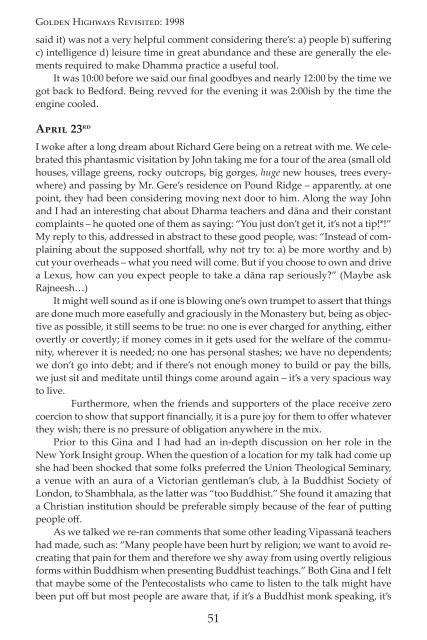Rugged Interdependency - Amaravati Buddhist Monastery
Rugged Interdependency - Amaravati Buddhist Monastery
Rugged Interdependency - Amaravati Buddhist Monastery
- No tags were found...
You also want an ePaper? Increase the reach of your titles
YUMPU automatically turns print PDFs into web optimized ePapers that Google loves.
Golden Highways Revisited: 1998said it) was not a very helpful comment considering there’s: a) people b) sufferingc) intelligence d) leisure time in great abundance and these are generally the elementsrequired to make Dhamma practice a useful tool.It was 10:00 before we said our final goodbyes and nearly 12:00 by the time wegot back to Bedford. Being revved for the evening it was 2:00ish by the time theengine cooled.April 23 rdI woke after a long dream about Richard Gere being on a retreat with me. We celebratedthis phantasmic visitation by John taking me for a tour of the area (small oldhouses, village greens, rocky outcrops, big gorges, huge new houses, trees everywhere)and passing by Mr. Gere’s residence on Pound Ridge – apparently, at onepoint, they had been considering moving next door to him. Along the way Johnand I had an interesting chat about Dharma teachers and dāna and their constantcomplaints – he quoted one of them as saying: “You just don’t get it, it’s not a tip!*!”My reply to this, addressed in abstract to these good people, was: “Instead of complainingabout the supposed shortfall, why not try to: a) be more worthy and b)cut your overheads – what you need will come. But if you choose to own and drivea Lexus, how can you expect people to take a dāna rap seriously?” (Maybe askRajneesh…)It might well sound as if one is blowing one’s own trumpet to assert that thingsare done much more easefully and graciously in the <strong>Monastery</strong> but, being as objectiveas possible, it still seems to be true: no one is ever charged for anything, eitherovertly or covertly; if money comes in it gets used for the welfare of the community,wherever it is needed; no one has personal stashes; we have no dependents;we don’t go into debt; and if there’s not enough money to build or pay the bills,we just sit and meditate until things come around again – it’s a very spacious wayto live.Furthermore, when the friends and supporters of the place receive zerocoercion to show that support financially, it is a pure joy for them to offer whateverthey wish; there is no pressure of obligation anywhere in the mix.Prior to this Gina and I had had an in-depth discussion on her role in theNew York Insight group. When the question of a location for my talk had come upshe had been shocked that some folks preferred the Union Theological Seminary,a venue with an aura of a Victorian gentleman’s club, à la <strong>Buddhist</strong> Society ofLondon, to Shambhala, as the latter was “too <strong>Buddhist</strong>.” She found it amazing thata Christian institution should be preferable simply because of the fear of puttingpeople off.As we talked we re-ran comments that some other leading Vipassanā teachershad made, such as: “Many people have been hurt by religion; we want to avoid recreatingthat pain for them and therefore we shy away from using overtly religiousforms within Buddhism when presenting <strong>Buddhist</strong> teachings.” Both Gina and I feltthat maybe some of the Pentecostalists who came to listen to the talk might havebeen put off but most people are aware that, if it’s a <strong>Buddhist</strong> monk speaking, it’s51
















